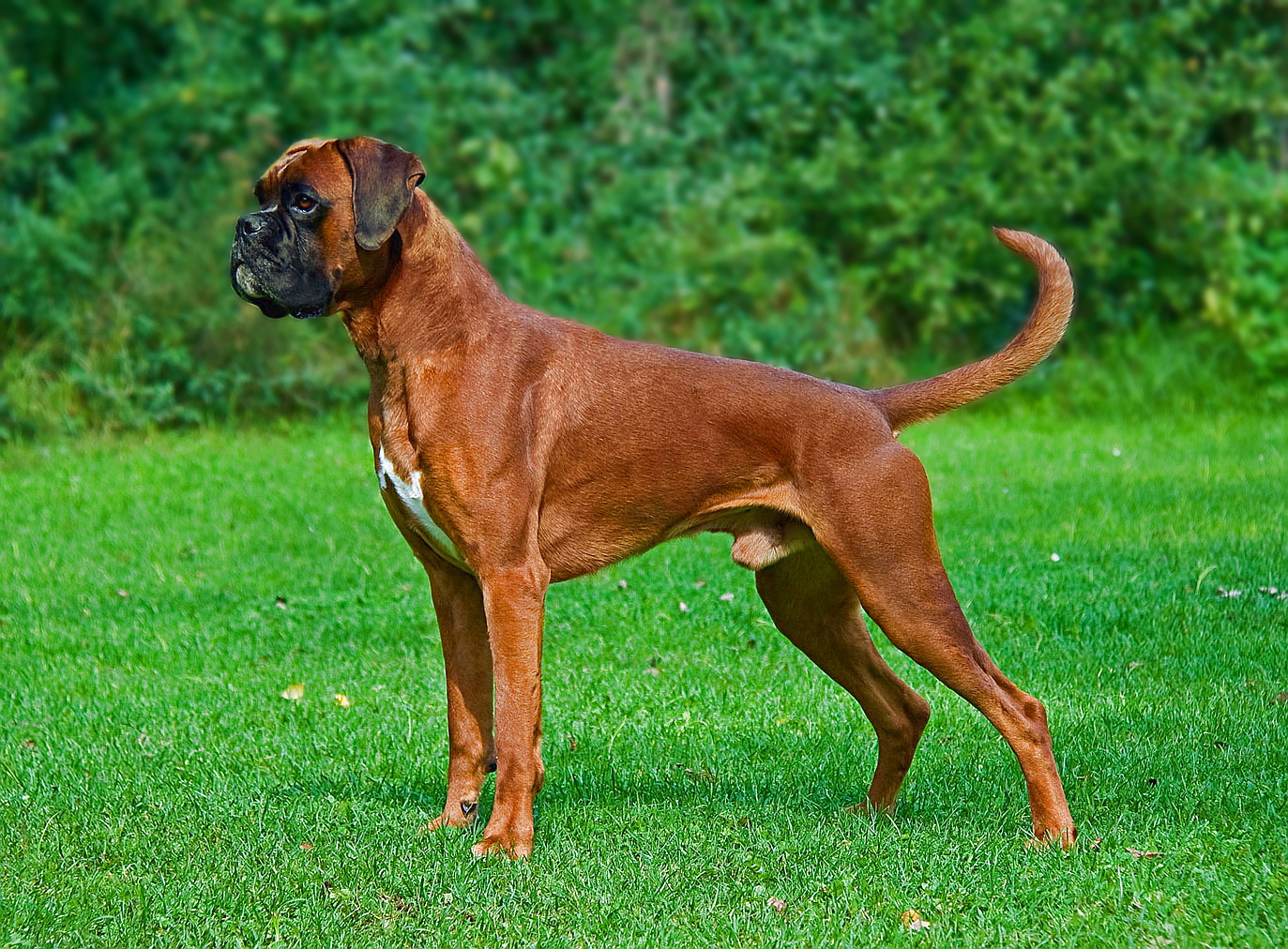

FAQs
Why Do Boxer Dogs Fart So Much
Modified: August 5, 2023
Find answers to general questions about why boxer dogs fart so much. Learn about the possible causes and how to manage excessive flatulence in your boxer.
(Many of the links in this article redirect to a specific reviewed product. Your purchase of these products through affiliate links helps to generate commission for Under-tec.com, at no extra cost. Learn more)
Table of Contents
- Introduction
- Anatomy and Digestive System of Boxer Dogs
- Factors Contributing to Excessive Flatulence in Boxer Dogs
- Diet and Food Intolerances in Boxer Dogs
- Gastrointestinal Issues and Boxer Dogs
- Breathing and Snoring Issues in Boxer Dogs
- Anal Gland Problems and Boxer Dogs
- Tips for Managing and Reducing Flatulence in Boxer Dogs
- Conclusion
Introduction
Boxer dogs are known for their energetic and playful nature, but they are also notorious for having excessive flatulence. If you are a proud owner of a boxer dog, you may have experienced the hilarity and discomfort of their frequent farting episodes. While it may be a source of amusement for some, excessive flatulence can be a cause for concern and inconvenience.
In this article, we will explore the reasons why boxer dogs fart so much and what you can do to manage and reduce their flatulence. Understanding the underlying factors contributing to excessive gas production in boxer dogs is essential in providing them with the care they need.
Boxer dogs have a unique anatomy and digestive system that may make them more prone to excessive flatulence. Their short-muzzled face, known as a brachycephalic shape, can affect their ability to adequately digest food and expel gas. Additionally, their diet, gastrointestinal issues, breathing problems, and anal gland problems can all contribute to increased farting.
If you are tired of dealing with stinky odors and awkward situations caused by your boxer dog’s gas, read on to discover the potential causes and effective strategies for managing and reducing flatulence in boxer dogs. By implementing these tips, you can help your boxer dog enjoy a happier, healthier, and less gassy life.
Anatomy and Digestive System of Boxer Dogs
To understand why boxer dogs fart so much, it’s essential to take a closer look at their unique anatomy and digestive system. Boxer dogs have a distinct physical structure that can contribute to their gassiness.
One of the key features of a boxer dog’s anatomy is their brachycephalic shape, characterized by their short muzzles. While their adorable flat faces make them irresistible, it can also pose challenges when it comes to digestion. The structure of their skull and jaw affects the way they eat and chew their food, potentially leading to increased air intake during meal times.
Additionally, boxer dogs have a relatively short and straight digestive tract compared to other breeds. This means that food has less time to be effectively broken down and absorbed, resulting in more undigested material reaching the large intestine. As a consequence, fermentation of these undigested compounds by gut bacteria produces excess gas, leading to those audible and odorous flatulence episodes.
Furthermore, boxer dogs have a relatively high stomach acidity. While this is beneficial for breaking down food and killing harmful bacteria, it can also contribute to increased gas production. The combination of a shorter digestive tract, rapid fermentation, and high stomach acidity creates a perfect storm for the production of excessive flatulence.
This unique anatomy and digestive system of boxer dogs make them more prone to gassiness compared to other dog breeds. However, it is important to note that each dog is an individual, and some boxers may experience more severe flatulence than others.
Now that we have an understanding of the boxer dog’s anatomy and digestive system, let’s explore the factors that contribute to their excessive flatulence and how you can manage it effectively.
Factors Contributing to Excessive Flatulence in Boxer Dogs
There are several factors that can contribute to the excessive flatulence experienced by boxer dogs. By understanding these factors, you can better manage and reduce your boxer’s gassiness.
Diet and Food Intolerances: One of the primary factors affecting a boxer dog’s flatulence is their diet. Certain food ingredients can cause gas production in their digestive system. Foods that are high in fiber, such as beans, lentils, and certain vegetables, can be difficult for dogs to digest and may lead to increased flatulence. Additionally, some boxer dogs may have specific food intolerances or allergies, such as gluten or lactose intolerance, that can further contribute to gas production.
Gastrointestinal Issues: Boxer dogs can be prone to gastrointestinal issues, such as irritable bowel syndrome (IBS) or inflammatory bowel disease (IBD), which can cause chronic flatulence. These conditions can lead to digestive system inflammation and impaired digestion, resulting in increased gas production.
Breathing and Snoring Issues: Boxer dogs are known for their distinctive breathing pattern and tendency to snore. These breathing issues, such as brachycephalic airway syndrome, can cause them to swallow more air, which can lead to increased flatulence. Additionally, snoring can disrupt normal sleep patterns, contributing to stress and digestive disturbances, further exacerbating gassiness.
Anal Gland Problems: Boxer dogs have anal glands located near their rectum, which can become impacted or infected. When these anal glands do not function properly, it can lead to discomfort and excessive licking or scooting. These actions can introduce additional air into the digestive system, resulting in increased flatulence.
It is important to note that the severity of flatulence and the specific factors contributing to it can vary from boxer dog to boxer dog. Some may be more sensitive to certain foods or have underlying health conditions that exacerbate their gassiness.
In the next section, we will delve into specific dietary considerations and tips for managing and reducing flatulence in boxer dogs.
Diet and Food Intolerances in Boxer Dogs
The diet of a boxer dog plays a significant role in their flatulence levels. Certain foods and ingredients can trigger excessive gas production, and some boxer dogs may have specific food intolerances or allergies. Understanding these dietary factors is crucial for effectively managing and reducing your boxer’s flatulence.
High Fiber Foods: Boxer dogs have sensitive digestive systems, and foods high in fiber can be difficult for them to digest. Beans, lentils, and certain vegetables like broccoli, cabbage, and cauliflower are known to cause gas in dogs. While these foods may have nutritional benefits, it’s important to be mindful of the quantities you feed your boxer to minimize excessive flatulence.
Grains and Gluten: Just like humans, some boxer dogs may have sensitivities or intolerances to grains and gluten. Common grains like wheat, corn, and soy can be challenging for dogs to digest and may lead to increased gas production. If you suspect your boxer has a grain or gluten intolerance, consider switching to a grain-free or gluten-free diet and monitor their flatulence levels.
Lactose Intolerance: While boxer dogs are not inherently lactose intolerant, some individuals may have difficulties digesting milk and dairy products. If your boxer experiences excessive flatulence after consuming dairy, it may be an indication of lactose intolerance. Consider opting for lactose-free or dairy-free alternatives to reduce their discomfort and gassiness.
Low-Quality Foods: The quality of the food you feed your boxer can also impact their flatulence. Cheap, low-quality dog foods often contain fillers, artificial ingredients, and preservatives that can be difficult for dogs to digest. These ingredients can lead to poor gut health and increased gas production. Opting for high-quality, natural dog foods with wholesome ingredients can help improve digestion and reduce flatulence.
If you suspect that your boxer dog’s diet is contributing to their excessive flatulence, it is advisable to consult with a veterinarian. They can provide guidance on appropriate dietary changes and potentially recommend specific diets suited to your boxer’s needs.
In the next section, we will explore the role of gastrointestinal issues in boxer dogs and how they can contribute to flatulence.
Gastrointestinal Issues and Boxer Dogs
Gastrointestinal issues can be a contributing factor to excessive flatulence in boxer dogs. Conditions such as irritable bowel syndrome (IBS) and inflammatory bowel disease (IBD) can lead to chronic digestive disturbances and increased gas production. Understanding these conditions and their impact on your boxer’s digestive health is essential for managing their flatulence.
Irritable Bowel Syndrome (IBS): IBS is a common gastrointestinal disorder characterized by inflammation and sensitivity in the intestines. Boxer dogs with IBS may experience symptoms such as chronic diarrhea, abdominal pain, and increased flatulence. While the exact cause of IBS in dogs is unknown, it is believed to be triggered by various factors, including stress, dietary changes, and bacterial imbalances in the gut.
Inflammatory Bowel Disease (IBD): IBD is a more severe form of gastrointestinal inflammation that can affect boxer dogs. It is characterized by chronic inflammation in the intestinal walls, leading to symptoms such as diarrhea, vomiting, weight loss, and excessive flatulence. IBD in dogs can be triggered by food allergies, intolerances, or an abnormal immune response to certain food ingredients.
If you suspect your boxer dog has gastrointestinal issues contributing to their flatulence, it is important to consult with a veterinarian. They can perform diagnostic tests, such as blood work, fecal analysis, or even endoscopy, to determine the underlying cause of your boxer’s digestive disturbances.
Once a diagnosis has been made, your veterinarian can recommend appropriate treatment options. This may include dietary adjustments, such as switching to a hypoallergenic or novel protein diet, or the use of medications to manage inflammation and regulate bowel movements. Following your veterinarian’s guidance and monitoring your boxer’s response to treatment can help reduce their flatulence and improve their overall digestive health.
In addition to veterinary intervention, there are also holistic approaches you can take to support your boxer’s gastrointestinal health. Probiotics and digestive enzymes can help promote a healthy gut flora and aid in digestion, reducing gas production. However, it is crucial to consult with your veterinarian before starting any supplements to ensure they are appropriate for your boxer’s specific condition.
By addressing and managing gastrointestinal issues in your boxer dog, you can minimize their flatulence and improve their overall well-being. In the next section, we will explore how breathing issues and snoring can contribute to excessive gas in boxer dogs.
Breathing and Snoring Issues in Boxer Dogs
Breathing issues and snoring are common characteristics of boxer dogs due to their brachycephalic (short-muzzled) face. While these features add to their distinctive appearance, they can also contribute to their flatulence levels. Understanding how breathing and snoring issues affect boxer dogs can help in managing their excessive gas production.
Brachycephalic Airway Syndrome: Boxer dogs are prone to brachycephalic airway syndrome, a condition caused by the unique shape of their skull and shortened airways. This syndrome can lead to respiratory difficulties, including increased effort to breathe and snorting sounds during sleep. These breathing challenges can cause boxer dogs to swallow more air, leading to increased flatulence.
Snoring: Boxer dogs are notorious for their snoring, which can be attributed to their brachycephalic face structure. Snoring occurs when the tissues in the airway partially block the flow of air during sleep. The loud snoring noises are the result of the vibrations produced as the air tries to pass through the narrowed airway. Snoring disrupts normal sleep patterns, which can impact digestion and contribute to increased gas production.
When boxer dogs struggle to breathe, they may open their mouths wider or pant to increase oxygen intake. This can result in swallowing more air, which can lead to subsequent flatulence episodes.
If your boxer dog has severe breathing or snoring issues, it is essential to consult with a veterinarian. They can assess the severity of the condition and provide appropriate treatment options. In some cases, surgical intervention may be necessary to widen the airways and alleviate breathing difficulties in brachycephalic breeds.
In addition to medical interventions, there are steps you can take at home to manage your boxer’s breathing and snoring issues and, in turn, reduce their flatulence:
- Elevate their sleeping area to help alleviate breathing difficulties during sleep.
- Ensure that their sleeping environment is cool and well-ventilated to promote better airflow.
- Use a humidifier to keep the air moist, as dry air can lead to increased snoring.
- Encourage regular exercise and weight management to improve overall respiratory health.
By addressing and managing breathing and snoring issues, you can help alleviate the excessive gas production in your boxer dog. But there is one more potential factor contributing to their flatulence – anal gland problems, which we will cover in the next section.
Anal Gland Problems and Boxer Dogs
Anal gland problems can be another factor contributing to excessive flatulence in boxer dogs. Boxers have anal glands located near their rectum, and when these glands become impacted or infected, they can cause discomfort and increased gassiness.
Impacted Anal Glands: Boxer dogs commonly have issues with impacted anal glands, also known as anal sacs. These small glands produce a smelly, oily substance that is normally released during bowel movements. However, if the glands do not empty properly, they can become impacted, leading to discomfort and irritation. Boxer dogs may show signs of scooting their rear end on the ground or excessively licking the area, which can introduce additional air into their digestive system and result in increased flatulence.
Anal Gland Infections: In addition to impaction, boxer dogs can also develop infections in their anal glands. Bacterial overgrowth can occur when the glands become clogged or if the dog’s immune system is compromised. Anal gland infections can cause inflammation, pain, and an unpleasant odor. Dogs with infected anal glands may exhibit signs of discomfort, including excessive licking, biting, or even fever.
If you suspect your boxer dog is experiencing anal gland problems, it is essential to seek veterinary attention. A veterinarian can perform a thorough examination of the anal glands and provide appropriate treatment, such as expressing the glands manually or prescribing antibiotics for infections. Severe or recurrent anal gland issues may require more extensive veterinary intervention, including surgical removal of the glands.
In addition to veterinary care, there are some preventive measures you can take to minimize the risk of anal gland problems and reduce flatulence:
- Ensure your boxer’s diet includes adequate fiber to promote normal bowel movements and proper gland emptying.
- Regular exercise can help stimulate bowel movements and encourage healthy gland function.
- Avoid over-bathing, as excessive grooming can strip the anal glands of their natural oils, leading to potential gland issues.
- Monitor your boxer’s anal area for any signs of swelling, discharge, or discomfort, and seek prompt veterinary care if you notice any abnormalities.
By addressing and managing anal gland problems, you can help alleviate your boxer’s discomfort and potentially reduce their flatulence. Now that we have explored the factors contributing to excessive flatulence in boxer dogs, let’s move on to the next section, where we will provide practical tips for managing and reducing flatulence in these playful pups.
Tips for Managing and Reducing Flatulence in Boxer Dogs
Dealing with excessive flatulence in your boxer dog can be challenging, but fortunately, there are steps you can take to manage and reduce their gassiness. By implementing these tips, you can help improve your boxer’s digestive health and minimize those stinky farting episodes.
Dietary Considerations:
- Opt for high-quality, easily digestible dog foods that are free from fillers, artificial ingredients, and preservatives.
- Avoid feeding your boxer high-fiber foods, such as beans, lentils, and certain vegetables, that can contribute to gas production.
- If you suspect food intolerances or allergies, consider switching to a limited ingredient or hypoallergenic diet recommended by your veterinarian.
- Feed smaller, more frequent meals to prevent overeating and reduce the amount of air swallowed during meals.
Proper Digestion:
- Ensure your boxer has access to clean and fresh water throughout the day, as hydration is essential for maintaining healthy digestion.
- Consider adding probiotics or digestive enzymes to your dog’s diet to promote a healthy gut flora and improve digestion.
- Slow down your boxer’s eating pace by using slow-feed bowls or food puzzle toys, which can help reduce the amount of air they swallow while eating.
Exercise and Weight Management:
- Engage your boxer in regular exercise to promote a healthy digestive system and overall well-being.
- Maintain a healthy weight for your boxer, as obesity can contribute to digestive issues and increased flatulence.
Minimize Stress:
- Create a calm and stress-free environment for your boxer, as stress can disrupt normal digestion and contribute to flatulence.
- Avoid sudden changes in their routine or environment that can trigger anxiety or stress.
Veterinary Care:
- Regularly visit your veterinarian for routine check-ups to monitor your boxer’s overall health and discuss any concerns regarding flatulence.
- Seek veterinary advice for potential underlying health issues contributing to excessive flatulence, such as gastrointestinal problems or anal gland issues.
By implementing these tips and maintaining a proactive approach to your boxer’s health, you can effectively manage and reduce their flatulence. Remember to consult with your veterinarian for personalized advice and recommendations specific to your boxer’s needs.
Now that you have a comprehensive understanding of the factors contributing to flatulence in boxer dogs and practical strategies to manage it, you can ensure a happier, healthier, and less gassy life for your beloved pooch.
Conclusion
Dealing with excessive flatulence in boxer dogs can be a source of frustration and discomfort. However, by understanding the factors contributing to their gassiness and implementing practical strategies, you can effectively manage and reduce their flatulence.
We explored the unique anatomy and digestive system of boxer dogs, which makes them more prone to excessive gas production. Factors such as diet and food intolerances, gastrointestinal issues, breathing and snoring problems, as well as anal gland problems, can all contribute to increased flatulence in these playful pups.
To help minimize flatulence in your boxer dog, it is important to consider their diet and make appropriate dietary adjustments. Opt for high-quality, easily digestible foods, avoiding high-fiber foods and potential allergens. Additionally, maintaining proper digestion, supporting gastrointestinal health, and managing weight through exercise and a balanced diet can contribute to reducing flatulence.
Managing breathing and snoring issues, ensuring proper anal gland health, and minimizing stress are also crucial in reducing excessive gas production. Regular veterinary care and consultations play an essential role in identifying and addressing any underlying health issues that may contribute to flatulence.
Remember, each boxer dog is unique, and what works for one dog may not work for another. It is important to pay attention to your boxer’s individual needs and consult with a veterinarian for personalized advice.
By applying the tips and strategies discussed in this article, you can improve your boxer dog’s digestive health, minimize flatulence, and ultimately provide them with a happier and more comfortable life.
So, embrace the fun-loving nature of your boxer dog without the worry of excessive flatulence, and enjoy the special bond you share with your furry friend.










